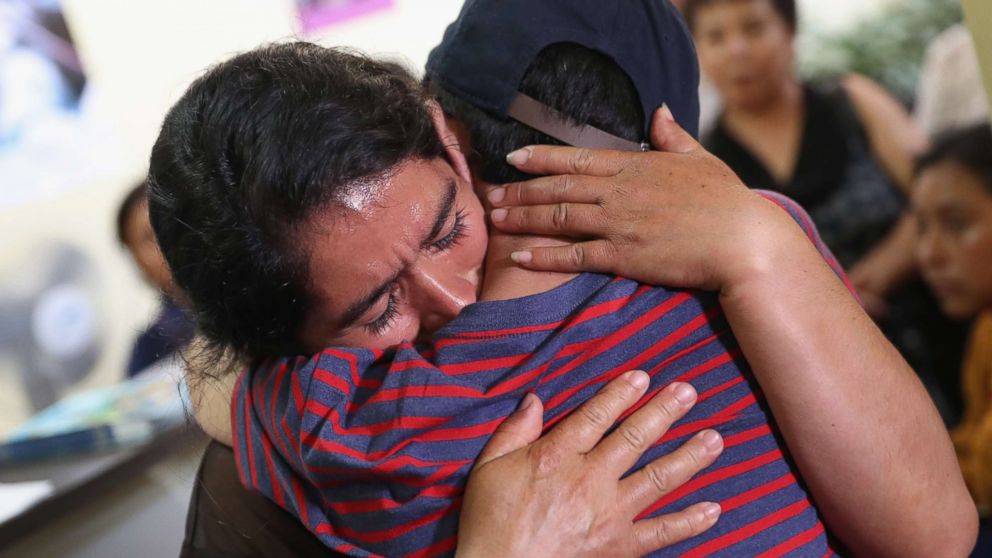A year of disruption: The Trump presidency's top 5 pivotal moments of 2018
In his second year in the White House, President Donald Trump proved he was dedicated to executing the controversial policies he promoted on the campaign trail.
In addition to the swirl of investigations and the political roller coaster of the midterm elections, Trump upended traditional concepts of global alliances, border and trade policy, and traditional White House norms in 2018.
Turnover within his Cabinet and staff broke records. On foreign policy, Trump rewrote how the United States interacts with traditional foes, surprising the world by meeting with North Korea’s Kim Jong Un and continuing to stun members of his party when he seemed to side with Russian President Vladimir Putin over U.S. intelligence agencies.
The Trump administration seized on opportunities to turn explosive campaign rhetoric into immigration and trade policy.
The long-term impact of those moves has yet to become clear. Is recent market volatility from tariffs a harbinger of an economic downturn ahead? When it comes to immigration, what impact will the period of family separation and, more recently, the death of a child while in border patrol custody have on this president’s legacy?
Though the Trump administration's pivotal moments this year are too numerous to capture, here are five of the biggest.
1. June 20: Trump reverses course on family separation after international uproar
Trump ended a policy in June that forcibly separated approximately 2,800 migrant children from their parents at the U.S.-Mexico border in a matter of weeks, according to updated numbers from the Health and Human Services Department. The policy began in April when then-Attorney General Jeff Sessions announced the administration intended to prosecute every adult who crossed the U.S.-Mexico border illegally. The so-called zero-tolerance policy effectively separated parents from their children and infants who legally couldn't be held in jails with them.
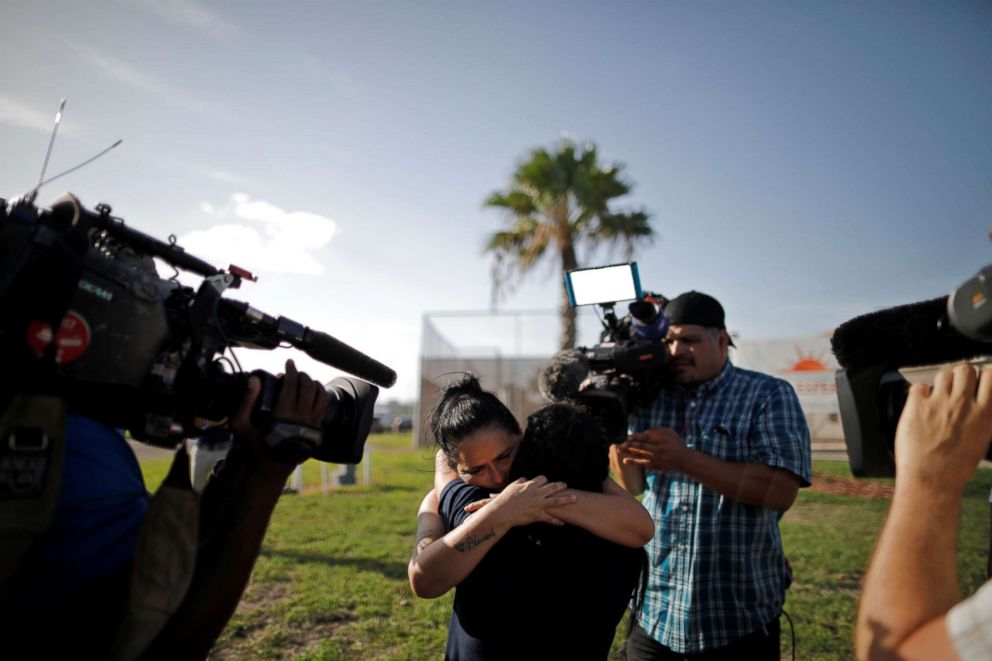
Images of children being held in converted warehouses, tents and big box stores dominated the spring news cycle. A widely publicized audio recording obtained by ProPublica featured the sobs of Central American children calling out for their parents.
The policy was condemned by Democrats and Republicans in Congress, religious conservatives and Pope Francis. Former first lady Laura Bush wrote an op-ed in the Washington Post calling the policy "cruel" and "immoral" and comparing it to the internment camps for U.S. citizens of Japanese descent during World War II.
As the outrage and pressure to end the policy grew, Trump blamed Democrats in Congress, although they didn't have majority control to enact new immigration laws. He also falsely claimed President Obama did the same thing. Families had been separated under previous administrations, including Obama's, but most of those adults were being detained for serious crimes.
Put pressure on the Democrats to end the horrible law that separates children from there parents once they cross the Border into the U.S. Catch and Release, Lottery and Chain must also go with it and we MUST continue building the WALL! DEMOCRATS ARE PROTECTING MS-13 THUGS.
— Donald J. Trump (@realDonaldTrump) May 26, 2018
Eventually, Trump was forced to terminate his own policy. He has since extended a military deployment at the border and railed against a so-called caravan of migrants, many of whom are seeking asylum, as he continues to fight for funding to build a border wall.
As of Dec. 17, eight children were still waiting to be reunited with their parents after being separated as a result of the zero-tolerance policy, according to HHS. Another 14,700 were in government care who walked across the border on their own, without parents.
2. December 4: Dow drops almost 800 points as Trump calls himself "Tariff Man"
The year 2018 will be remembered as the year Trump's trade wars began in earnest. For a president who has billed himself as "unpredictable", this is one confrontation many saw coming.
Trump’s feelings about trade haven’t changed much since the 1980s when he suggested the U.S. should impose a 20 percent tax on Japanese imports. When China emerged as the second-largest economy, that country became his new target.
On the campaign trail, his instincts on trade were well-received in factory towns where many workers blamed China for their woes. In the White House, Trump started by instituting tariffs on steel and aluminum imports on some of our closest allies, then proceeded by going after China with tariffs on $250 billion worth of goods. He has threatened to target as much as $450 billion if negotiations fall apart.
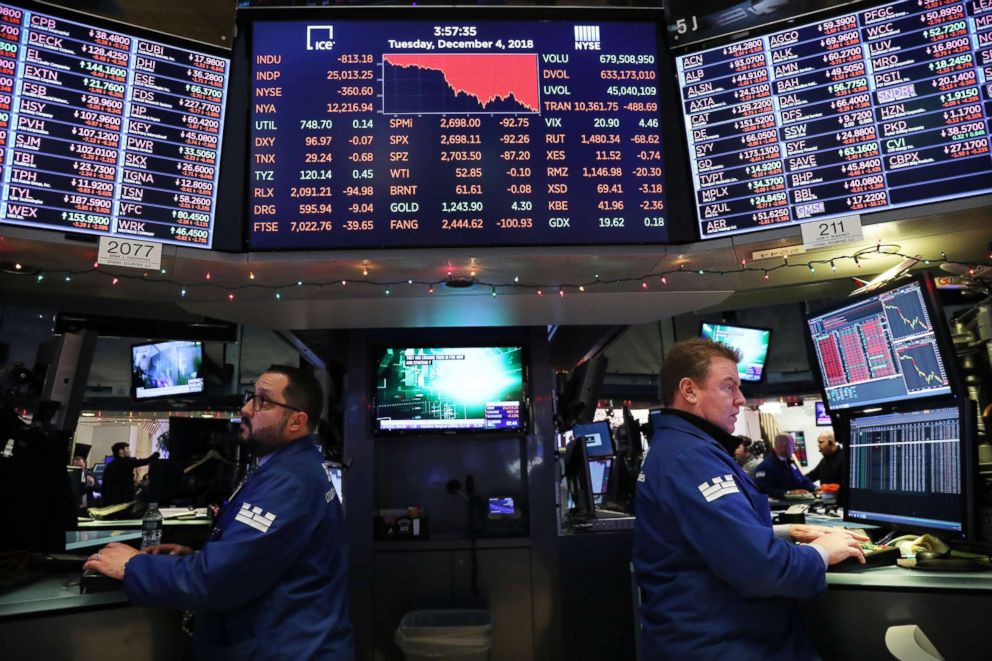
So far, while the government has had to step in to help certain farmers hurt by retaliatory tariffs, it hasn't led to significant price hikes on consumer goods -- at least not yet. But the prospect of a lasting trade war that could restrict global growth has caused stocks to sink. Volatile negotiations and uncertainty haven't helped.
A prime example came in early December. Trump and his Chinese counterpart, Xi Jinping, emerged from dinner at the G-20 meeting in Argentina with a deal not to impose additional tariffs for 90 days while the two countries negotiate a deal. Stocks surged the Monday following that weekend dinner. But the details released from the Chinese and U.S. governments differed, and even members of the Trump White House offered mixed messages on the agreement.
By that Tuesday, Trump was tweeting new threats and gave himself a new nickname.
"I am a Tariff Man. When people or countries come in to raid the great wealth of our Nation, I want them to pay for the privilege of doing so," Trump tweeted.
....I am a Tariff Man. When people or countries come in to raid the great wealth of our Nation, I want them to pay for the privilege of doing so. It will always be the best way to max out our economic power. We are right now taking in $billions in Tariffs. MAKE AMERICA RICH AGAIN
— Donald J. Trump (@realDonaldTrump) December 4, 2018
The Dow dropped almost 800 points, erasing the gains of the previous two days. Dow and S&P selloffs this fall, many of them tied to trade concerns, erased all of 2018's gains.
3. November 7: Attorney General Jeff Sessions becomes the latest Trump Cabinet casualty, raising questions about the fate of the Mueller investigation
After enduring the president’s public scorn for more than a year, Attorney General Jeff Sessions was finally pushed out of his role this fall. Trump announced Sessions’ resignation hours after the midterm elections on Twitter. Sessions made it clear that the decision was the president’s.
“At your request, I am submitting my resignation,” Sessions wrote in an undated resignation letter.
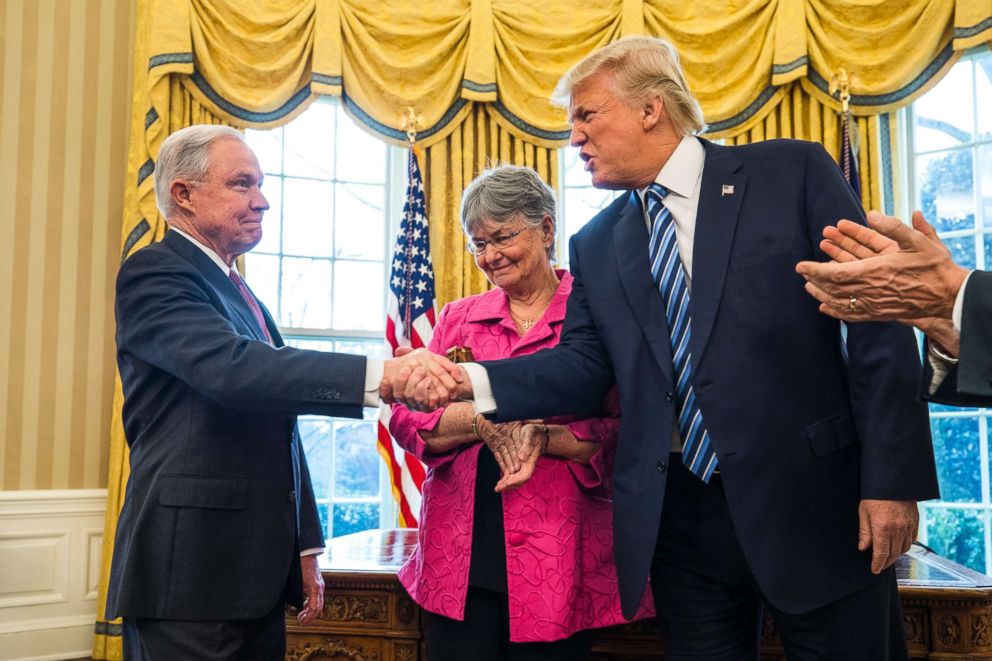
Sessions’ exit contributed to the record-breaking turnover numbers in the Trump administration n 2018. Including the forced resignation of Interior Secretary Ryan Zinke in December, the Trump administration shed more Cabinet-level officials in a single year than any previous administration in at least 25 years, according to the Brookings Institute. The group reports that Chief of Staff John Kelly’s December resignation also broke the record for the most chiefs of staff within the first two years of any administration.
While one could debate whether Trump is fulfilling his campaign promise to “drain the swamp,” his Cabinet and White House staff are exiting at a rapid pace.
But Sessions’ departure is also significant because of the impact it may have on the fate of the Russia investigation.
Sessions could never escape the ire of the president, who became agitated when Sessions recused himself from the Russia investigation in March 2017. That recusal ultimately led to Robert Mueller’s appointment as special counsel.
Incoming House Minority Leader Nancy Pelosi tweeted that it was impossible to read Sessions’ firing as “anything other than another blatant attempt by @realDonaldTrump to undermine & end Special Counsel Mueller’s investigation.” Trump named Sessions’ former chief of staff Matthew Whitaker as his interim replacement. Whitaker has been a public critic of the Russia investigation, stating in a radio interview that there was “no collusion” between Trump’s presidential campaign and Russia.
It is impossible to read Attorney General Sessions’ firing as anything other than another blatant attempt by @realDonaldTrump to undermine & end Special Counsel Mueller’s investigation.
— Nancy Pelosi (@NancyPelosi) November 7, 2018
4. July 16: President Trump stands with Russian President Vladimir Putin, cites his “strong and powerful” denial that Russia interfered in the 2016 election
The word “treason” reverberated throughout Washington among Trump’s critics on July 16 after President Trump seemed to side with the Russian president over U.S. intelligence agencies at a joint press conference.
"I have President Putin, he just said it's not Russia. I will say this. I don't see any reason why it would be," President Trump said in Helsinki, Finland.
He continued: “So I have great confidence in my intelligence people, but I will tell you that President Putin was extremely strong and powerful in his denial today.”
Trump's own intelligence community has consistently maintained that Russia did, in fact, meddle in the 2016 U.S. presidential election. Trump’s comments were delivered three days after the U.S. Justice Department indicted 12 Russian government agents for hacking the Democratic Party during that election.
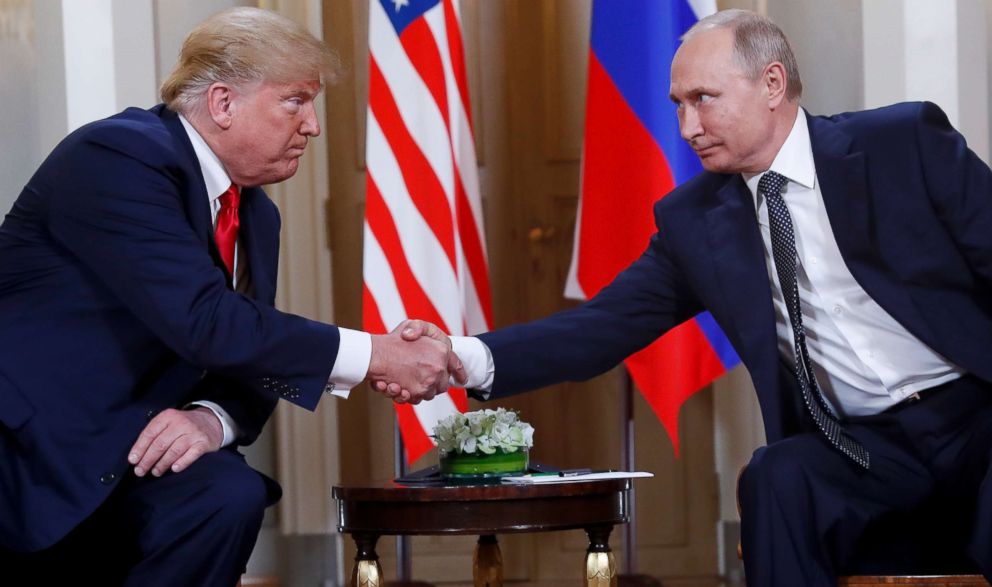
After condemnation from Republican members of Congress and former intelligence officials, Trump backtracked upon returning to the U.S. He told reporters that he meant to say the exact opposite of what he stated at the press conference. “The sentence should have been, ‘I don’t see any reason why it wouldn’t be Russia,’” Trump said, reading from notes in the White House Cabinet room. “Sort of a double negative.”
Even then, Trump stopped short of a clear endorsement of the intelligence agencies’ consensus on Russian interference. He stated it “could be other people, also” and “there’s a lot of people out there.”
Why should this be considered a notable moment? Most obviously, as the president’s relationship with Russia during the 2016 campaign is under investigation, warm overtures to the Russian president raises questions. It is also part of a broader trend of President Trump warming to dictators. He's heaped praise on North Korea’s Kim and the Saudi Crown Prince, among others.
Finally, the president has regularly and openly expressed skepticism towards his own government’s conclusions throughout his administration -- whether it be the Federal Reserve’s decision to raise interest rates, the Environmental Protection Agency’s findings on climate change, or any number of decisions by the Justice Department involving investigations into his campaign. Trump seems to attack the judiciary when a decision is made that doesn’t suit him and split from his own intelligence agencies when their conclusions don’t meld with his policy plans. His comments in Helsinki crystallized this tendency.
5. June 18: Trump makes nice with North Korea’s Kim Jong Un
Trump upended years of U.S. foreign policy this summer by holding a historic summit with Kim, the goal being to get North Korea off a nuclear path. The vague deal that resulted from that meeting may not have dramatically altered the nuclear standoff as promised. It was emblematic of a president who speaks in broad terms and declares victory when a lot of details have yet to be agreed upon.
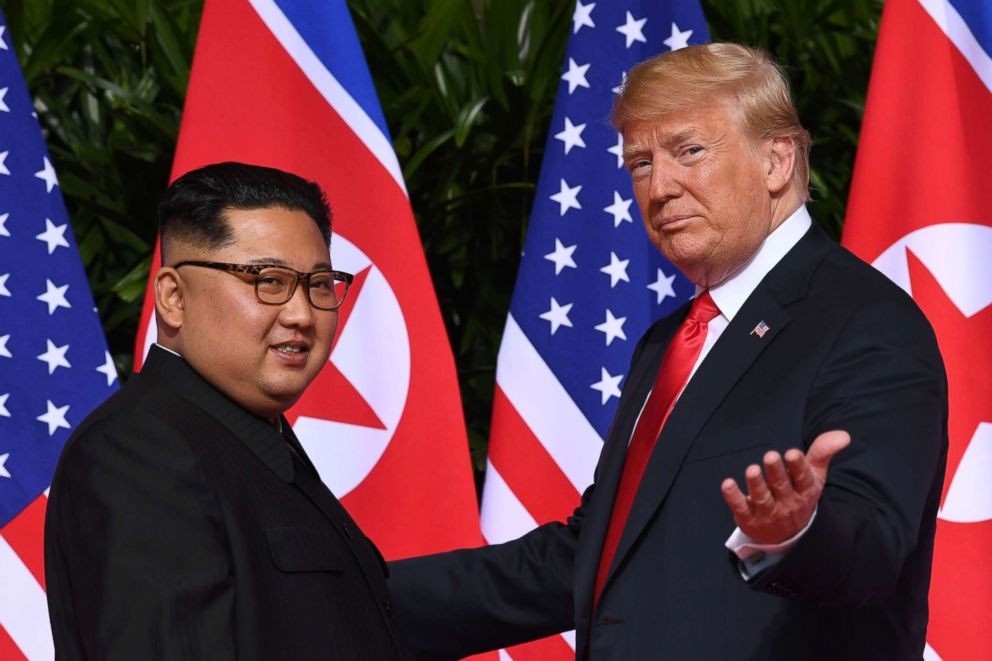
The origins of the meeting were also classic “unpredictable” Trump. A delegation from South Korea was visiting the White House in March. Trump called them into the Oval Office and agreed to meet the North Korean dictator before informing his aides.
It was a controversial move but lauded by Democrats and Republicans, who expressed cautious optimism that it could provide a step forward in denuclearization. The announcement also marked a change in posture from Trump, following an explosive exchange of insults between the two leaders -- Kim calling Trump a “mentally deranged U.S. dotard” after Trump threatened Kim with “fire and fury the likes of which this world has never seen.”
Less than a year later, the two shared smiles and handshakes. Kim promised North Korea would work toward “complete denuclearization.”
The president boasted that the agreement reached was a “very, very comprehensive document”. He called the summit itself “a very great moment in the history of the world,” and made declarations on Twitter that North Korea was no longer a nuclear threat.
Just landed - a long trip, but everybody can now feel much safer than the day I took office. There is no longer a Nuclear Threat from North Korea. Meeting with Kim Jong Un was an interesting and very positive experience. North Korea has great potential for the future!
— Donald J. Trump (@realDonaldTrump) June 13, 2018
But U.S. investigators have since claimed that North Korea has continued to pursue nuclear and missile programs.
Trump said this fall that he’s “in no rush” and that he’s preparing for a second summit with the North Korean leader in the “not too distant future.” He indicated at a September rally in West Virginia that he and Kim still enjoy a friendly relationship.
"We went back and forth, then we fell in love," Trump said. "He wrote me beautiful letters. And they are great letters. We fell in love."
ABC News' Anne Flaherty contributed to this report
